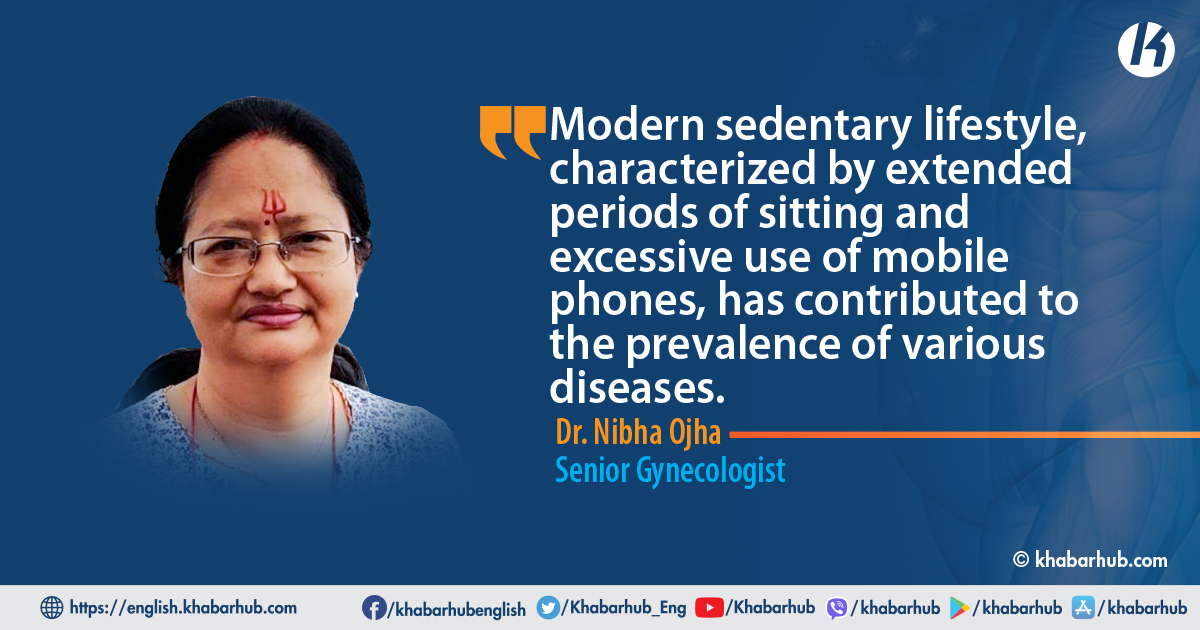0%

KATHMANDU: In recent years, there has been a concerning rise in reproductive problems among women in various countries, including Nepal.
These issues encompass challenges related to reproductive health, such as irregular menstrual cycles and increasing cases of infertility.
A related issue is Polycystic Ovary Syndrome (PCOS). We have tried to delve into what PCOS entails, its causes, symptoms, control and prevention measures, as well as the treatment cost and condition in Nepal.
Here is an excerpt from the interview with Dr. Niva Ojha, a Senior Gynecologist:
Could you please shed some light on Polycystic Ovary Syndrome (PCOS)?
Certainly! Polycystic Ovary Syndrome, commonly known as PCOS, is a hormonal disorder that affects women of reproductive age.
It is characterized by the presence of multiple cysts on the ovaries, irregular menstrual cycles, and excessive production of androgen hormones.
What is the issue with Polycystic Ovary Syndrome (PCOS) in women’s reproductive health?
Polycystic Ovary Syndrome (PCOS) is a health condition that specifically affects a woman’s ovaries.
It can disrupt the hormonal balance in women, leading to a wide range of issues, including complications related to pregnancy and disturbances in menstrual cycles.
What causes this problem?
Particularly in the present-day context, this phenomenon has become increasingly prevalent, primarily attributed to modern lifestyle choices and dietary habits.
Sedentary behavior has become a norm, with minimal physical activity among individuals.
Even for short distances, people rely on vehicles instead of walking, leading to a lack of exercise.
Additionally, the rising consumption of fast food and processed meals has contributed to an increase in obesity rates and various health conditions.
While previously believed to primarily affect individuals over the age of 20, there has been a concerning rise in the occurrence of these issues among 14-year-old girls as well.
What are the common symptoms of PCOS?
Some women experience irregular menstrual cycles, with only seven or eight periods occurring per year, or even fewer.
This condition can be accompanied by obesity. Furthermore, excessive bleeding during menstruation may occur, and the duration of menstruation may be prolonged in the early stages.
Some individuals may also face challenges with fertility. Additional symptoms include excessive hair growth on the face, stomach, and back, as well as hair loss, frequent facial acne, weight gain, mental health issues such as depression or anxiety, an increased risk of diabetes, and difficulties with sexual health.
Therefore, by considering age and symptoms, healthcare professionals can diagnose the condition.
Fortunately, PCOS can be effectively managed through appropriate medication and treatment.
What is the typical treatment approach for women seeking medical help for PCOS at the hospital?
Initially, the focus of treatment for women seeking medical assistance for Polycystic Ovary Syndrome (PCOS) at the hospital is to address the underlying causes contributing to the condition.
This is crucial as PCOS can significantly impact menstrual patterns, leading to irregular or absent periods.
If menstrual cycles are occurring at intervals of 2 to 6 months, medication may be prescribed to regulate the menstrual cycle. It is important to emphasize the importance of maintaining a healthy diet and appropriate weight.
In cases where excessive hair growth is present, timely treatment options are provided.
Fertility issues are addressed accordingly. Furthermore, ultrasound examinations play a significant role in diagnosing PCOS.
What are the potential risks or complications associated with PCOS in the long run?
PCOS can lead to infertility in women, posing challenges for conception. There is an increased likelihood of developing diabetes during pregnancy (gestational diabetes).
Furthermore, complications such as high blood pressure, miscarriage, and premature birth may arise during pregnancy.
Additionally, PCOS raises the risk of developing conditions like metabolic syndrome, sleep apnea, endometrial cancer, and depression.
What are the measures for controlling and preventing PCOS?
PCOS can be diagnosed through ultrasound examinations. It is a condition that can be effectively managed with appropriate medication.
Taking proactive measures with our diet is crucial from the early stages. By maintaining a healthy weight, it is possible to alleviate the symptoms associated with PCOS.
Medications are utilized to restore hormonal balance, specifically estrogen and progesterone.
Additionally, medications are employed to regulate insulin levels, manage unwanted hair growth, and enhance fertility.
The development of PCOS is influenced by factors such as obesity and dietary choices.
In the past, women were engaged in activities that naturally provided them with sufficient physical exercise.
However, the modern sedentary lifestyle, characterized by extended periods of sitting and excessive use of mobile phones, has contributed to the prevalence of various diseases.
By making positive changes to our diet and lifestyle, we can not only prevent polycystic ovaries but also reduce the risk of other long-term health issues.